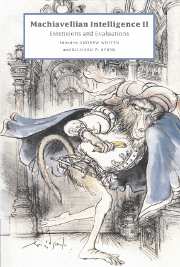Book contents
- Frontmatter
- Contents
- Contributors
- Preface
- 1 Machiavellian intelligence
- 2 Friendships, alliances, reciprocity and repair
- 3 Why Machiavellian intelligence may not be Machiavellian
- 4 Social intelligence and success: Don't be too clever in order to be smart
- 5 Minding the behaviour of deception
- 6 The Machiavellian mindreader
- 7 Exploiting the expertise of others
- 8 Primates' knowledge of their natural habitat: As indicated in foraging
- 9 Evolution of the social brain
- 10 The modulatory of social intelligence
- 11 The Technical Intelligence hypothesis: An additional evolutionary stimulus to intelligence?
- 12 Protean primates: The evolution of adaptive unpredictability in competition and courtship
- 13 Egalitarian behaviour and the evolution of political intelligence
- 14 Social intelligence and language: Another Rubicon
- Index
4 - Social intelligence and success: Don't be too clever in order to be smart
Published online by Cambridge University Press: 23 November 2009
- Frontmatter
- Contents
- Contributors
- Preface
- 1 Machiavellian intelligence
- 2 Friendships, alliances, reciprocity and repair
- 3 Why Machiavellian intelligence may not be Machiavellian
- 4 Social intelligence and success: Don't be too clever in order to be smart
- 5 Minding the behaviour of deception
- 6 The Machiavellian mindreader
- 7 Exploiting the expertise of others
- 8 Primates' knowledge of their natural habitat: As indicated in foraging
- 9 Evolution of the social brain
- 10 The modulatory of social intelligence
- 11 The Technical Intelligence hypothesis: An additional evolutionary stimulus to intelligence?
- 12 Protean primates: The evolution of adaptive unpredictability in competition and courtship
- 13 Egalitarian behaviour and the evolution of political intelligence
- 14 Social intelligence and language: Another Rubicon
- Index
Summary
Consequences of behaviour and meta-learning, and social intelligence
Don't be too clever in order to be smart
Our title alludes to Clever and Smart, comic figures created by Ibañez, which contrast in the behaviour they use to reach goals. Whereas Clever shows much refinement, Smart acts without many detours, and succeeds as often as Clever. This result would be surprising to common sense or to analysts of social interaction, Machiavellian intelligence and cognitive competence (Handel, 1982; Hinde, 1983; Anderson, 1985). Indeed, the analysis of the cognitive prerequisites of social interaction would normally lead to the conclusion that sophisticatedly planned and performed behaviour is the means to achieve social goals. Yet there is a caveat. The point we want to make is that the consequences of behaviour, not the degree of underlying cognitive complexity, determine social success. Straightforward action—reaction behaviour such as reciprocity (an eye for an eye) may be as efficacious as subtle diplomacy. For example, reciprocity may be well suited to stop overt physical aggression such as a child's temper tantrum. Watzlawick et al. (1967) tell illuminating stories of unsuccessful communication resulting from either endless recursive mindreading or ignorance of quite simple interaction rules (a man who needs a hammer imagines that his neighbour may be unwilling to lend one, and after a lot of thinking on the neighbour's possible motives, knocks angrily at the other's door shouting that he would never accept even a donated hammer). Watzlawick et al. call on interactants to communicate on their communication rules (to meta-communicate) to resolve problems, and like Dennett (1983), think that we can manage only few embedded propositions.
- Type
- Chapter
- Information
- Machiavellian Intelligence IIExtensions and Evaluations, pp. 86 - 111Publisher: Cambridge University PressPrint publication year: 1997
- 5
- Cited by

